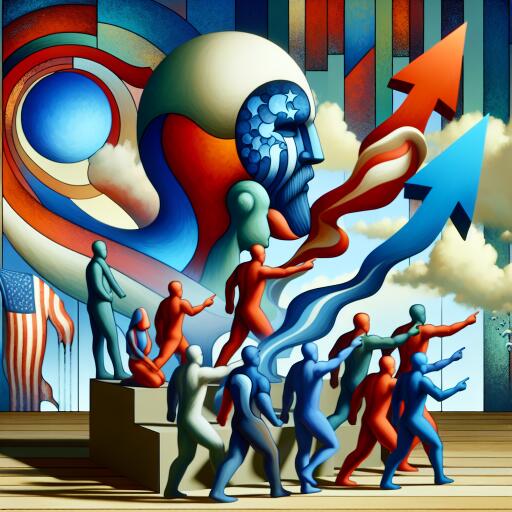The Unreal Politics Of Unreal Men: Navigating the Mirage of Modern Ideologies
In an era where the lines between the virtual and the real blur, the domain of social media emerges not just as a platform for exchange but as a battleground for ideological supremacy. It’s often said, “Social media isn’t real life,” but events and phenomena rooted in these platforms suggest otherwise. The instance of TikTok influencing political maneuvers or social trends shaping the identities and actions of its user base underscores the tangible impact of what many consider an intangible space.
The influence of virtual spaces on physical realities is a complex phenomenon. The alarming trends of self-harm among teenagers, attributed to viral content on applications like TikTok, illustrate a dark intersection where virtual influences manifest with grave real-world consequences. This intersection is not solely a contemporary issue but one that echoes the historical relationship between media and ideology.
The catastrophic ideologies of the 20th century, including Nazism and Communism, demonstrated an acute understanding of media’s power to craft reality. Propaganda, through newspapers, films, and broadcasts, constructed alternate realities potent enough to mobilize nations towards ruinous ends. These historical precedents reveal the inherent dangers in a society’s immersion into constructed realities, where the unreal becomes indistinguishable from the real.
Modern social media platforms, in many ways, amplify these precedents. They construct worlds where the fantastical becomes plausible, and collective beliefs can enforce personal realities. The capacity to redefine truths, as seen in challenging scientific facts or historical events, thrives in these echo chambers, untethered from the anchoring of shared reality.
The transference of fantasy into tangible societal changes, particularly through political channels, signifies a critical shift. Ideologies that spawn within the confines of virtual communities gain momentum, often clashing with established societal norms outside their digital birthplace. This clash is not merely ideological but manifests in physical spaces, challenging laws, rights, and personal safety.
The path from belief to reality follows a trajectory marked by persuasion, propagation, and eventually, enforcement. Initially, a consensual collective fantasy within a community may seem harmless. However, as these fantasies garner political power, the imposition of these once-private imaginations onto the public sphere often escalates to social unrest and conflict.
This cycle of unreal politics is sustained through a systematic indoctrination that targets the most impressionable and malleable among us: children. The push towards younger audiences by movements and ideologies capitalizes on the inherent nature of children to weave and inhabit narratives far removed from the harshness of reality. The consequences of such indoctrination are profound, potentially reshaping societal norms and values from the ground up.
The principle of constructing realities is not new and has historically pivoted on the manipulation of narratives to control populations. The emergence of mass media technologies facilitated the spread of these narratives, enveloping societies in constructed realities that skewed perceptions and molded ideologies.
As virtual realities become increasingly immersive, the delineation between the digital and the physical wanes. The pending advent of fully realized metaverses, populated with lifelike AI, promises—or threatens—a future where the lines between the real and the unreal are not just blurred but entirely erased.
The phenomenon of unreal politics thrives on the pliability of reality in the digital age. Ideologies that defied logic or reality in the past find fertile ground in a world where belief often supersedes evidence. The stakes of this new reality are high, as it challenges the very foundations upon which societies are built: shared truths, collective goals, and a consensus on what constitutes reality itself.
The evolution of unreal politics reflects a broader societal shift towards an existence increasingly mediated by technology. As individuals navigate these treacherous waters, the challenge becomes one of discernment—distinguishing between the constructed narratives that dominate virtual platforms and the tangible world that persists beyond the screen.
In the quest for ideological supremacy in virtual spaces, it’s crucial to remember that the repercussions of these battles extend far beyond the confines of any social media platform. They seep into the fabric of our societies, shaping policies, influencing behaviors, and redefining the boundaries of what we consider real. As we stand on the precipice of this new reality, the imperative to navigate the unreal politics of unreal men becomes not just a philosophical dilemma but a practical necessity, crucial for the sustenance of our shared societal fabric.









